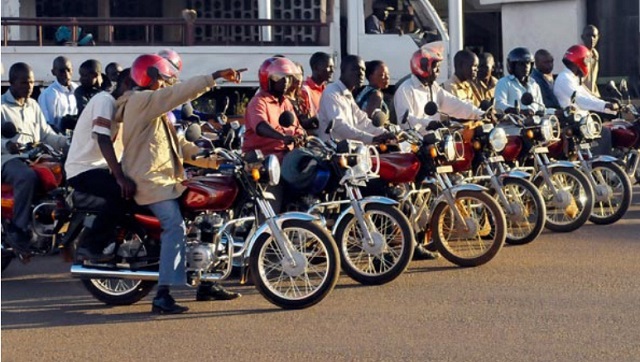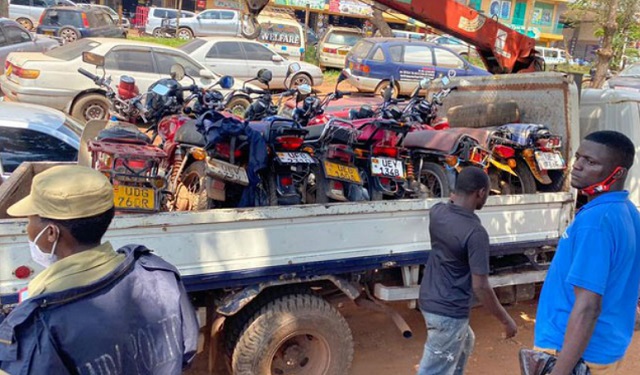
People die as they promise and don’t deliver
Kampala, Uganda | MUBATSI HABATI | Kampala City Lord Mayor Erias Lukwago is once again battling to ensure boda-boda remain in the capital.
This after an orchestrated move in January saw Parliament order the Kampala Capital City Authority (KCCA) to decongest the Central Business District (CBD) by removing boda boda riders.
In a meeting of Parliament’s Committee on Physical Infrastructure, the Minister of State for Kampala Capital City and Metropolitan Affairs, Kyofatogabye Kabuye and the KCCA Deputy Executive Director, David Ssali Luyimbazi, said street vendors, boda bodas, and public service vehicles would be pushed from the CBD.
According to people familiar with the inner workings of Kampala city, these moves are likely to fail because, based on past experience, both the Lukwago side and the Kyofatogabye side “are playing politics and will achieve nothing.”
They say there are many regulations that KCCA can enforce on the boda-boda business but the only person whose view counts on the boda-boda issue is President Yoweri Museveni.
And they say Museveni has for over two decades, always jumped from one side to the other but ended up on the boda-boda side.
“The boda-boda will stay in the city with all their chaos because of Museveni,” said one of them.
Museveni has not intervened yet and the political side of the boda-boda business, which in the past has seen Museveni pushing the same line of “don’t disturb boda boda”, has not come out openly.
But even without Museveni’s intervention, the move against boda-boda, vendors, and public service vehicles is likely to fail because it involves coordination of many ministries and government departments and personalities with competing interests.
The belief that boda boda are impossible to regulate is promoted by rich people who have invested in fleets of boda-boda. Next is the incompetence of law enforcers and and large numbers involved that have led to failure of past moves. The result is corruption by those who allegedly benefit from protection money collected from the unregulated boda-boda that starts at the boda-boda stages, their leaders in occupation associations, the KCCA enforcers, traffic police and bosses in KCCA and the government.
“Most officers will grab you even by 8am, impound your bike without a valid reason and won’t let you go until you have given them at least Shs50,000,” says Fred Semakula.
Semakula was in early July speaking at a press conference organised by National Economic Empowerment Dialogue (NEED), a political organisation led by former presidential candidate Joseph Kabuleta.
Kabuleta said the extortion extends to the top officials in government.
“It’s just a symptom of a bigger problem, and the officers who extort these riders are part of a whole structure that starts from the top,” he said.
Kabuleta called the press conference just days after the Ministry of Kampala started pushing boda-boda riders to register.
The registration which Minister Kyofatogabye launched in February with a March 01 deadline had flopped and the July directive was an attempt to revive it.
Lukwago’s move
Lukwago has already moved to block the moves by filing a case against them in court. He and several KCCA councilors say the ministers are moving to evict the boda-bodas from the city without an enabling law and without clear directions.
The Kyofatogabye camp counters that they are acting under the National Security Council Act 2000.
Doreen Nyanjura, the Deputy Lord Mayor of Kampala says she is concerned that, according to the Minister for Kampala, Minsa Kabanda and Kyofatogabye, only 7000 boda-bodas out of 200,000 boda-bodas will be allowed to operate in Kampala.
Nyanjura says their directives will render over 100,000 riders surviving hand-to-mouth unemployed at a time when the economic crisis is at its worst.
“Kyofatogabye is condemning Ugandans to death, and we, the political leaders, shall not let him,” she says.
The official statements of Lukwago, Nyanjura and the KCCA councilors appear to have given the boda-boda voice. Boda bodas who had been evicted in May have returned to the Non-Motorized Transport corridor along Namirembe Road in Kampala.
Denis Bukenya, a rider of the motorcycle taxis in Kampala, says creating an orderly boda-boda business is not a bad idea.
“But the government needs to first work out a plan,” he says.
Many boda boda appear reluctant to register and are critical of the process.
Baker Senyonjo, a boda-boda rider, says the enforcement officers are using the registration drive to extort money from them.
“When you go to the place where we were directed to go to register, they just give you a form to fill and you pay Shs75,000 and that’s it,” he says.
Officially, the riders are supposed to pay Shs10,000 for medical tests and Shs 50,000 for five days of training that lasts two hours daily.
But Senyonjo says all other aspects of registration, including a medical examination, are not done.
The combined force of KCCA, police, Ministry of Transport, and Ministry for Kampala, has in the past failed to regulate the boda-boda because of their big numbers.
According Nyanjura’s figure of are an estimated 200,000 boda-boda operating in a city, there is one boda-boda taxi for every 10 city dwellers. According to some reports, about one quarter of the Uganda police forces estimated at 10,000 are based in Kampala. That means if all are deployed in the city, there would be just one police officer for every 20 boda-boda, and KCCA has a smaller enforcement unit.
Boda-boda politics
But the whole act appears to be following an establishment pattern, according to people familiar with the inner workings of the city.
Museveni will order the ministers and KCCA to back off, they say, and Lukwago will celebrate success.
Then part two of the circus will swing in as Museveni seeks to win-over the boda-boda from the Lukwago camp. They will be advised to form Saccos and they will be given money.
That is what happened in 2006, an election year, when then Commissioner of Police Community Affairs, Asan Kasingye, tried to regulate boda-bodas. He commissioned traffic wardens under Kampala Union Boda Boda Cyclist Association-Kuboca. But President Museveni ordered then Inspector General of Police, Kale Kayihura, to disband them.
In 2010, in the run-up to another election year, KCCA organised an election of boda boda leaders that produced Abdallah Kitatta, an NRM stalwart who was Chairman of the NRM in Lubaga, as patron.
In 2013, there was a move to register riders but it failed following opposition from Kitata, and other political leaders.
Kitatta set about working with Kayihura and other security bosses to torture, extort, and arbitrarily arrest riders and other civilians with impunity until President Museveni ordered his arrest in 2018.

Museveni, Lukwago failures
Museveni and Lukwago have become experts at playing boda-boda politics mainly because it wins them votes as it covers up their incompetence as leaders, some analysts say.
According to them, boda-bodas emerged to fill a gap created by the failure of leaders to provide public transport systems. Instead those in charge have thrown the provision of public transport in the hand s of an informal private sector that is overwhelmed.
Those in charge have also failed to provide good road networks and the few unplanned, narrow, unmaintained pot-holed roads can only support motorcycles and bicycles. Even the few city dwellers who can afford private cars or benefit from the fleets of government departments are often forced to abandon them and jump on boda-bodas.
The result is poor service, high fares, dangerous driving, clogged roads, traffic chaos, indiscipline, and accidents.
Late last year, President Museveni announced that KCCA had finalised plans for a private company, METU Bus Industries, to manufacture buses to ease transport in the city and its metropolis. Almost a year later, the promised buses have not come.
In an address to the nation on July 20, Museveni swung in a new direction. He now wants electrical buses manufactured by the government company, Kiira Motors.
In 2019, there was excitement when it emerged that the government was to invest Shs600 billion in a venture involving Ashok Leyland buses from India under a company called Tondeka Bus Service.
Lukwago has also been previously mentioned in a case involving a Chinese company, Foton East Africa (U) Ltd, to set up an inter-city bus service with an initial fleet of 300. That also flopped.
The government first unveiled a Kampala master plan for specialised lanes for buses, pedestrians, cyclists, and motorcyclists in 2012. Years later, there have been only a few feeble moves.
In 2020, the government and KCCA laid out an elaborate plan to regulate boda bodas.
In the plan, boda-bodas would be banned from the city centre and areas out of the Central Business District (CBD) would also have boda-boda free zones.
All boda boda and taxi operators would be registered and organised based on their stages. They would register with companies such as Safe Boda and Uber that have digital Apps. They would elect recognised leaders. The number of boda-boda stages would be reduced.
The plan also involved registering all people working in the transport sector. This plan was pushed by then minister for Kampala, Betty Amongi.
In July 2020, KCCA published a list of 579 stages in the five divisions of Kampala. Rubaga Division was allocated 179 stages, Nakawa 146, Makindye 136, Kawempe 89, and Central division 32 stages. The central division was allocated the least number of stages because the government wanted to implement a Boda Boda free zone.
The Boda Boda free zone would run along boundaries of Wampewo Roundabout- Jinja Road to Kitgum House junction – Access Road – Mukwano Road to Clock Tower –Kafumbe Mukasa Road –Kisenyi Road –Mackay Road- Kyaggwe Road- Watoto Church-Bombo Road – Wandegeya – Hajji Musa Kasule Road- Mulago roundabout- Kamwokya junction – Sturrock Road – Prince Charles Drive- Lugogo Bypass–Jinja Road- Wampewo Roundabout.
But the plan was soon shelved on the orders of President Museveni. It was also opposed by Lukwago and KCCA councilors. They argued that transporters were unhappy that they had not been consulted.
In the case of boda-boda, it was claimed that majority of them are illiterate and could not use the tech of Apps of Safe Boda, Uber and others.
Existing operators, including Pioneer Easy Buses which started in 2021, are limping party because of the failure of the government and KCCA to develop a city Bus Rapid Transport system.
The small 14-seater taxis which ply city routes cannot reach most destinations, are poorly maintained, filthy, and spend hours in jam on clogged roads.
Ensure public transport
Experts in urban planning have said that the government must first ensure order in the city transport sector by providing public transport before moving into regulation and enforcement.
High density areas should have public transport that is orderly, efficient, affordable, and modern catering for bicycling and reducing pollution.
Dr Olive Kobusingye, a renowned injury epidemiologist and former head of the Trauma Unit at Mulago National Referral Hospital, wants removal of boda-boda transport in crowded areas like Kampala. She says they must be replaced by mass carrier buses.
Kobusingye says without public mass carriers like buses for Kampala commuters, many more people will die or be maimed on the risky boda-bodas and the government and families will continue losing millions of Shillings spent on treating boda-boda accident victims. “Some people have sustained permanent conditions and need care for the rest of their life,” she says.
But other experts, such as Ndugu Omongo, the Executive Director of Uganda Professional Drivers Network-UPDN, say boda-boda should be trained. He says lack of training for boda-boda riders is one of the major reasons behind the crashes.
“The boda-boda job is seen as a survival venture for many youths. They buy motorcycles or ride for their bosses without any skills. Many do not know what road signs mean. Training schools teach someone how to be patient and how to respect other road users. Many boda-boda riders are impatient and they get knocked for that,” Omongo said.
Meanwhile, the unregulated boda-bodas continue to claim lives and maim other in accidents. The police report for 2020 released by Commissioner Lawrence Niwabiine shows that more than 1,500 die in boda-boda accidents every year while over 4,000 survive with heinous injuries.
Some transport and physical planning analysts say boda bodas have in some way become the mirrors of our societies. In Rwanda, for instance, boda riders are highly regulated, neatly organised and clearly identifiable, which reflects the highly regimented state in which they operate. Unlike in Uganda where boda riders break all traffic rules with impunity, in Rwanda boda riders fear even the slightest breach of the law because the government has made the consequences very clear. That is the view of political scientist, Tom Goodfellow, who has studied boda-boda systems in Uganda and Rwanda and written a book; `Taming the “Rogue” Sector: Studying State Effectiveness in Africa through Informal Transport Politics’.
He reports that there was a particularly fierce crackdown on boda-boda in Kampala in September-October 2009. He says boda-boda drivers without helmets and documents were required to pay Shs68,000.
“However, if drivers had ready cash, the police would often instead take a bribe of around Shs30,000 and let them go.”
He says another crackdown followed in February 2010, initially supported by Museveni.
“The following month he (Museveni) ordered the police to halt it, claiming that `nobody should arrest you because you have no helmet,’ in direct contradiction of the campaign he had mandated the police to carry out,” Goodfellow writes.
A KCC official noted at the time that the sporadic crackdowns improved nothing: “It is like when you collect ants in a cup and then you release them to go.”
Goodfellow says some boda-boda drivers are acutely aware of the contradictions.
He quotes one saying: “We often fail to keep the law because the president spoiled the whole system.”
****
 The Independent Uganda: You get the Truth we Pay the Price
The Independent Uganda: You get the Truth we Pay the Price



